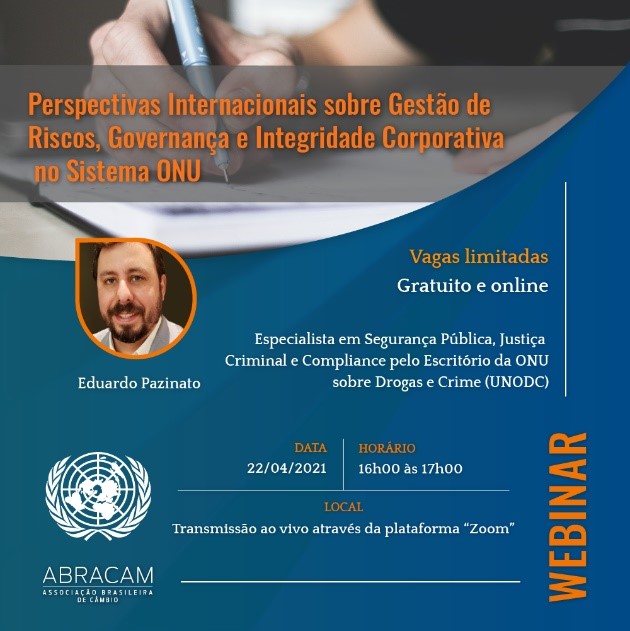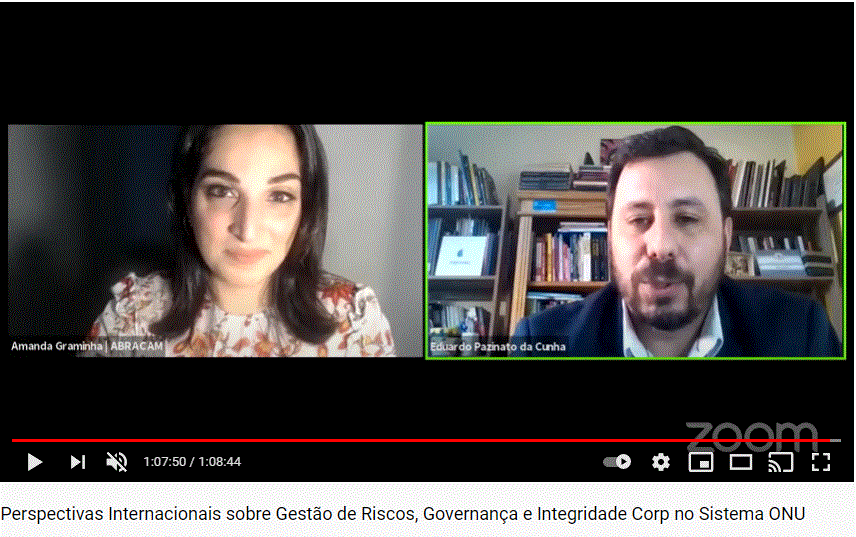
Brasilia, 26 April, 2021 - The United Nations Office on Drugs and Crime (UNODC) participated in the webinar "International Perspectives on Risk Management, Governance and Corporate Integrity in the UN System". The event took place last Thursday (the 22nd) and was organized by ABRACAM - the Brazilian Exchange Association and was attended by approximately 70 participants.
Among the participants were ABRACAM members, representatives from banks, exchange brokers and exchange correspondents (directors, managers and members of the strategic line and compliance), police officers and civil police agents.
UNODC's Public Security, Criminal Justice and Compliance Specialist, Eduardo Pazinato, made a comprehensive presentation on UNODC's work in Brazil and worldwide, which is based on international conventions.
Present in all regions of the world through its global programmes and with field offices in 80 countries, UNODC is the guardian of the three Conventions on Drugs, the UN Convention against Corruption (UNCAC), or Merida Convention, the UN Convention against Organized Crime (UNTOC), also known as the Palermo Convention. These last two are considered the main global instruments to fight transnational organized crime and corruption in the United Nations system
The UNODC specialist presented the topic in four parts: 1. impacts of corruption on the pandemic; 2. conventions and mandates; 3. the Brazilian legal microsystem to fight corruption and promote corporate integrity; 4. regulatory gaps and new global initiatives of UNODC in Brazil.
Impacts of Corruption

Pazinato said that while the cost of corruption is difficult to calculate due to the hidden nature of the crime, the International Monetary Fund (IMF) estimates the the global cost is around $2.6 trillion, per year, or 5% of the global GDP, and companies and individuals pay, on average, more than $1 trillion in bribes each year.
Corruption and the Covid-19 Pandemic
The declaration of the Covid-19 pandemic by the World Health Organization (WHO) on 11 March, 2020 has brought, on a global scale, risks of corruption in public procurement, especially in the health sector.
Large amounts of resources have been earmarked to provide economic responses to mitigate the debilitating effects of Covid-19 and to protect the most vulnerable people and businesses. Without adequate safeguards, the disbursement of such resources involves significant corruption risks that can reduce both the beneficial impact on individuals and the quality of services or supplies provided.
COVID-19 cases continue to increase and resources are needed to respond to the growing demand related to public procurement and oversight mechanisms to help ensure that countries respond effectively to this crisis.
UNCAC provides a comprehensive, multi-disciplinary framework to prevent and combat corruption in public procurement by establishing transparent processes, open decision making, whistleblower protection systems, and oversight mechanisms to help ensure accountability
Anti-Corruption Project (Covid-19)
UNODC recently launched the "Global Project on Promoting Anti-Corruption Measures on Response and Recovery of COVID-19". Funded by the Bureau of International Law Enforcement and Narcotics (INL) of the United States Department of State, the project aims to support nine countries in South Africa, South America, and Southeast Asia to promote effective response and recovery in the context of Covid-19, and future emerging crises, through transnational programmes on transparency and integrity in public procurement, whistleblower protection, and oversight mechanisms.
United Nations Convention against Corruption (UNCAC)
Pazinato also explained in detail the main chapters of the UNCAC, such as Chapter II, which deals with preventive measures, III, criminalization and law enforcement, IV, international cooperation, and V, asset recovery, in addition to several articles that address issues such as potential consequences of corruption, cooperation between national agencies and the private sector, measures to prevent money laundering, and banking secrecy.
United Nations Convention against Transnational Organized Crime (UNTOC)
The United Nations Convention against Transnational Organized Crime, UNTOC also known as the Palermo Convention, is the main global instrument for combating transnational organized crime. It was approved by the UN General Assembly on 15 November, 2000, when it was made available to member states for signature, and entered into force on 29 September, 2003.
For more information on UNODC's work in combating corruption, click here.
Learn more: http://www.agenda2030.com.br/